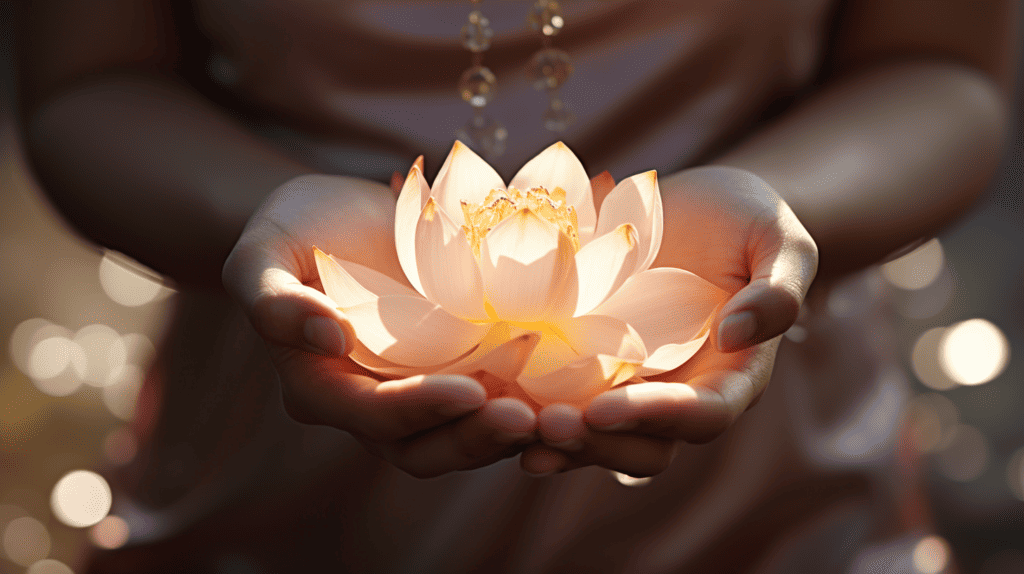As an experienced spiritual meditation teacher, I have witnessed the transformative power of meditation on individuals struggling with social anxiety. Social anxiety is a common mental health condition that can cause intense feelings of fear, nervousness, and self-consciousness in social situations. It can be challenging to manage and significantly impact an individual’s quality of life.
Meditation has emerged as a promising tool to meditation for social anxiety. Research suggests that mindfulness-based meditation practices can be as effective as cognitive-behavioral therapy (CBT) in treating social anxiety. Meditation can help individuals develop a more accepting and compassionate attitude towards their thoughts and emotions, reducing the intensity of negative emotions and increasing resilience in stressful situations.
Implementing a regular meditation practice can be a practical and accessible way to manage social anxiety.
Key Takeaways
- Meditation is a promising tool to manage social anxiety, with research suggesting it can be as effective as cognitive-behavioral therapy (CBT).
- Developing a regular meditation practice can help individuals cultivate a non-judgmental awareness of their thoughts and emotions, improve their ability to manage social situations, and reduce the intensity of negative emotions.
- Different types of meditation practices can help manage social anxiety, and understanding the science behind meditation and anxiety can provide insight into how it works.
Types of Meditation for Social Anxiety
As an experienced spiritual meditation teacher, I have found that meditation can be an effective tool for reducing social anxiety symptoms. Here are some types of meditation that can help:
1. Mindfulness Meditation for Social Anxiety
Mindfulness training meditation involves focusing on the present moment and paying attention to your thoughts and feelings without judgment. This meditation can help reduce anxiety by increasing your awareness of your thoughts and emotions and helping you develop a more positive relationship with them.
Buddhist monks reduce social anxiety through mindfulness meditation practices that cultivate nonjudgmental awareness and acceptance of thoughts and emotions.
2. Breath-focused Meditation to Reduce Anxiety
Breath-focused meditation involves focusing on your breath and observing it without judgment. This can help reduce anxiety by calming your mind and body and helping you to become more centered and focused.
3. Mantra Meditation
Mantra meditation involves repeating a word or phrase, such as “om” or “peace,” to help focus your mind and reduce anxiety. This type of meditation can be beneficial for people who have difficulty quieting their minds.
Tip: Reduce any stimulus in the room that will distract your attention before you meditate!
4. Body Scan Meditation to Relax Your Body
Body scan meditation involves focusing on each part of your body, one at a time, and relaxing it. This can help reduce anxiety by promoting relaxation and reducing muscle tension.
5. Transcendental Meditation
Transcendental meditation involves repeating a mantra in a specific way to promote deep relaxation and reduce anxiety. A trained instructor often teaches this type of meditation and can be particularly helpful for people new to meditation.
6. Yoga Meditation
Yoga meditation combines physical postures with meditation techniques to promote relaxation and reduce anxiety. This type of meditation can benefit people who enjoy physical activity and want to incorporate meditation into their daily routine.
In summary, many types of meditation can help reduce social anxiety symptoms. By finding the type of meditation that works best for you, you can develop a regular meditation practice to help you feel more centered, calm, and focused in your daily life.
Practical Guide to Implementing Meditation
As an experienced spiritual meditation teacher, I have found that implementing meditation into your daily routine can be a powerful tool for managing social anxiety. Here are some practical tips to help you get started.
Finding a Comfortable Position
First, find a comfortable position to sit or lie down in. Being comfortable, relaxing, and focusing on your breath is essential. You can sit cross-legged on a cushion or chair with your feet flat on the floor. If you prefer to lie down, ensure you’re comfortable and won’t fall asleep.
Deep Breathing Techniques
Once you’re comfortable, start by taking a few deep breaths. Breathe in through your nose and out through your mouth. Focus on your breath and feel it moving in and out of your body. If your mind wanders, gently bring your attention back to your breath.
Using a Meditation App
If you’re new to meditation, using a meditation app can be helpful. There are many apps available that offer guided meditations for different purposes, including managing social anxiety. Some popular apps include Headspace, Calm, and Insight Timer. These apps can help you stay on track and provide guidance if you’re unsure where to start.
Implementing meditation into your daily routine can be a powerful tool for managing social anxiety. By finding a comfortable position, using deep breathing techniques, and utilizing a meditation app if needed, you can start to experience the benefits of meditation for yourself.
The Science Behind Meditation and Anxiety
As a spiritual meditation teacher, I have seen first-hand the positive effects of meditation on anxiety. But what does science say about it? Research suggests that mindfulness-based meditation can be as effective as cognitive-behavioral therapy (CBT) for treating social anxiety.
Neuroscientists have found that meditation can lead to changes in brain structure, specifically in the hippocampus and posterior cingulate. The hippocampus is responsible for memory and learning, while the posterior cingulate is involved in self-referential thoughts and emotions. These structural changes may explain why meditation can lead to a reduction in anxiety symptoms.
In addition to structural changes, meditation can also affect brain function. Studies have shown that meditation can decrease activity in the amygdala, the part of the brain responsible for the fight-or-flight response. By reducing amygdala activity, meditation may help to decrease anxiety and stress.
Researcher and neuroscientist Sarah Lazar has conducted studies on the effects of meditation on the brain. Her research has shown that regular meditation can increase gray matter in the prefrontal cortex, which is responsible for executive functions such as decision-making and attention. This increase in gray matter may explain why meditation can improve cognitive function and emotional regulation.
The science behind meditation and anxiety is promising. Meditation can lead to structural changes in the brain, reduce amygdala activity, and increase prefrontal cortex gray matter. While more research is needed, these findings suggest that meditation can be an effective tool for managing anxiety.
Managing Social Phobias Through Meditation
Social phobias, also known as social anxiety disorders, are one of the most common mental health issues, affecting over 15 million American adults. Social phobias involve an intense fear of social situations and interactions. People with social phobias often experience debilitating physical symptoms such as panic attacks, sweating, trembling, and increased heart rate in social settings.
I usually recommend that you meditate to help manage social phobias. Studies show that mindfulness-based meditation practices can significantly reduce anxiety and fear responses. Regular meditation helps individuals cultivate non-judgmental awareness, increase resilience to stress, and develop healthy coping mechanisms.
Jon Kabat-Zinn and Meditation for Anxiety

Jon Kabat-Zinn is a professor of medicine emeritus at the University of Massachusetts Medical School and a leading figure in bringing mindfulness meditation into mainstream medicine. He developed the Mindfulness-Based Stress Reduction (MBSR) program in 1979, which uses meditation, yoga, and body awareness techniques to help people cope with stress, anxiety, chronic pain, and other conditions.
Kabat-Zinn’s Research on Meditation and Anxiety
Kabat-Zinn has conducted extensive research demonstrating the benefits of mindfulness meditation for anxiety, depression, and overall mental health. Some key findings from his studies:
- In a 1992 study, Kabat-Zinn found that patients who completed an 8-week MBSR program showed significant reductions in anxiety and depression symptoms compared to a control group. These improvements were maintained at a 3-month follow-up.
- A 2003 study showed MBSR decreased anxiety and negative mood states in patients with anxiety disorders, including panic disorder, generalized anxiety disorder, and social anxiety disorder.
- Research has shown that MBSR can reduce anxiety, improve quality of life, and change how the brain processes emotions in patients with social anxiety disorder.
- MBSR has been found to decrease anxiety symptoms in students, healthcare professionals, and prison inmates, among other populations.
How Meditation Helps Anxiety According to Kabat-Zinn
Kabat-Zinn emphasizes cultivating mindfulness – a nonjudgmental awareness of the present moment. This allows people to objectively observe their anxious thoughts and emotions rather than get caught up in them. Meditation also activates relaxation responses in the body to directly counter anxiety and stress reactions. Regular mindfulness meditation practice can:
- Teach people to recognize anxiety triggers and signs of escalating anxiety.
- Enable people to step back from anxious thoughts/emotions and view them more objectively.
- Build resilience and adaptability to handle life’s stresses and uncertainties.
- Promote acceptance of oneself and one’s internal experiences, reducing self-judgment.
- Induce deep relaxation and calm to counter the mind and body’s stress response.
Kabat-Zinn’s Guidance on Meditation for Anxiety
Kabat-Zinn recommends starting with short periods of meditation (e.g., 5-15 minutes daily) and gradually increasing over time. Even brief practices can help disrupt rumination and anxious thought patterns. He emphasizes being nonjudgmental about distractions and gently returning focus to the present. Kabat-Zinn guides people to focus on sensations of breathing, bodily sensations, sounds, or repetitive phrases to anchor attention.
Letting thoughts and emotions flow by without reacting to them is key. Practicing accepting and allowing feelings of anxiety helps reduce their intensity over time. Jon Kabat-Zinn’s pioneering work has demonstrated meditation’s potential as an accessible, drug-free way to manage anxiety.
His MBSR program provides a practical framework to cultivate mindfulness and gain its benefits. Research continues to support the value of mindfulness-based approaches for anxiety.
Understanding Social Anxiety

As a spiritual meditation teacher, I have seen how social anxiety can affect individuals in different ways. Social anxiety is a type of anxiety disorder that causes excessive fear, nervousness, and self-consciousness in social situations. It is a common mental health condition that affects millions of people worldwide.
People with social anxiety disorder may experience intense feelings of anxiety and negative thoughts when faced with social situations such as public speaking, meeting new people, and attending social gatherings. These emotions can trigger physical symptoms such as sweating, trembling, and an increased heart rate.
Social anxiety disorder can stem from various factors, including genetics, environmental factors, and life experiences. It can also result from negative thought patterns and rumination, making social situations feel overwhelming and unbearable.
People with social anxiety disorder may struggle to form and maintain relationships, which can lead to feelings of loneliness and isolation. It is essential to understand that social anxiety disorder is a treatable condition, and there are various methods to manage and overcome it.
Meditation is one such method that can help individuals manage their social anxiety. By practicing mindfulness meditation, individuals can learn to focus on the present moment, leading to decreased negative thoughts. This can lead to increased self-esteem and a sense of calmness and relaxation in social situations.
In summary, social anxiety disorder is a common mental health condition that can cause excessive fear, nervousness, and self-consciousness in social situations. It can stem from various factors, including genetics, environmental factors, and negative thought patterns. Meditation is one method that can help individuals manage their social anxiety by reducing rumination and negative thoughts.
Other Therapies and Treatments for Social Anxiety
When it comes to treating social anxiety, there are several therapies and treatments available. In addition to meditation, other therapies and treatments that are effective include cognitive behavioral therapy, psychotherapy, and medication.
Cognitive Behavioral Therapy
Cognitive behavioral therapy (CBT) is a type of therapy that focuses on changing negative thought patterns and behaviors. This therapy can be effective in treating social anxiety by helping individuals identify and challenge negative thoughts and beliefs about themselves and social situations. CBT can also help individuals learn new coping skills and strategies for managing anxiety.
Psychotherapy
Psychotherapy, also known as talk therapy, involves working with a therapist to identify and address the underlying issues that contribute to social anxiety. This therapy can be effective in helping individuals develop a better understanding of their thoughts and feelings and learn new coping strategies for managing anxiety.
Medication
Medication can also be an effective treatment option for social anxiety. Antidepressants, such as selective serotonin reuptake inhibitors (SSRIs), can help reduce symptoms of anxiety by regulating levels of serotonin in the brain. Benzodiazepines, such as Xanax or Valium, can also be used to treat anxiety, but they are generally prescribed for short-term use due to the risk of dependence and withdrawal symptoms.
As an experienced spiritual meditation teacher, I have found that combining meditation with other therapies and treatments can be especially effective in treating social anxiety. Working with a qualified clinician is vital to determine the best treatment plan for each individual.
How to Handle Social Situations with Meditation

As someone who has been practicing meditation for many years, I can attest to its effectiveness in managing social anxiety. Whether it’s attending a party or simply interacting with others in a social situation, meditation can help you stay calm, focused, and confident.
One of the most important things to remember when using meditation to handle social situations is to focus on your breath. By taking deep, slow breaths, you can calm your mind and relax your body, which can help reduce feelings of anxiety. Try to breathe in slowly through your nose, hold for a few seconds, and then breathe out slowly through your mouth.
Another technique that can be helpful is to focus on a specific object or thought. This can help distract your mind from anxious thoughts and keep you focused on the present moment. For example, you could focus on the sensation of your feet on the ground or repeat a calming mantra to yourself.
It’s also important to practice visualization techniques that can help boost your confidence. For example, you could visualize yourself successfully navigating a social situation and feeling calm and confident. This can help you feel more prepared and less anxious when the situation arises.
Finally, remember that meditation is a practice; it takes time and dedication to see results. Don’t get discouraged if you don’t notice an immediate improvement in your social anxiety. Keep practicing, and you will gradually build the skills and confidence you need to handle any social situation.
In summary, meditation can be a powerful tool for managing social anxiety. By focusing on your breath, using visualization techniques, and staying present in the moment, you can stay calm, confident, and focused in any social situation.
The Impact of Regular Meditation on Mental Health
As an experienced spiritual meditation teacher, I have seen firsthand the positive impact of regular meditation on mental health. The practice of mindfulness-based stress reduction (MBSR) has been shown to reduce symptoms of anxiety and depression in a range of clinical populations.
Research has shown that taking a few minutes each day to focus on the present moment can reduce stress, pain, depression, and more. By tuning into our thoughts and feelings, we can dial down the body’s response to stress and bring a sense of calm to our daily lives.
The benefits of meditation extend beyond just reducing stress and improving mood. Positive emotions brought about by meditation can help address various mental health problems like social anxiety disorder, post-traumatic stress disorder (PTSD), and depression.
In addition to its mental health benefits, meditation has been shown to positively affect physical health outcomes, such as reducing blood pressure and improving sleep quality.
Overall, regular meditation can significantly impact mental health and well-being. Incorporating mindfulness practices into our daily routines can reduce stress, improve mood, and cultivate a greater sense of calm and balance.
Further Research and Studies on Meditation and Social Anxiety
As an experienced spiritual meditation teacher, I have seen firsthand the positive effects of meditation on social anxiety. While more research is needed to understand the mechanisms behind these effects fully, recent studies have shown promising results.
One study published in the Journal of Anxiety Disorders found that mindfulness-based interventions, such as mindfulness-based stress reduction (MBSR) and mindfulness-based cognitive therapy (MBCT), were effective in reducing anxiety and depression symptom severity in a range of treatment-seeking individuals. Another systematic review and meta-analysis of acceptance- and mindfulness-based interventions found that they were effective in reducing symptoms of anxiety disorders such as generalized anxiety disorder and social anxiety disorder.
In addition to mindfulness-based interventions, other forms of meditation have also been studied for their potential benefits for social anxiety. For example, a study by researchers at the Massachusetts Institute of Technology (MIT) found that meditation can improve social learning and memory. Another study published in the Journal of Cognitive Psychotherapy found that guided imagery meditation was effective in reducing symptoms of social anxiety.
While these studies provide promising evidence for the effectiveness of meditation in reducing social anxiety, more research is needed to understand the mechanisms behind these effects fully and to determine the most effective types and durations of meditation for social anxiety. Nonetheless, the evidence so far suggests that meditation can be a valuable tool for those struggling with social anxiety.
Conclusion on People With Social Anxiety Finding Meditation
The research shows that regular mindfulness meditation practices can help reduce fear, nervousness, and negative thought patterns associated with social situations. By cultivating nonjudgmental awareness and acceptance, meditation enables individuals to respond to anxiety-provoking triggers with more resilience and equanimity.
While more studies are still needed, the evidence so far indicates meditation can provide an accessible and effective way for people to take control of their social anxiety. Implementing a consistent meditation routine, along with other therapies like CBT, can empower individuals struggling with social phobias to navigate through life’s social demands with greater confidence and ease.
FAQ on Meditation for Social Anxiety
Q: What is mindfulness meditation?
A: Mindfulness meditation is a practice that involves focusing on the present moment in a non-judgmental way. It often involves paying attention to the breath, body sensations, or external stimuli.
Q: How can meditation help with social anxiety?
A: Meditation can help with social anxiety by promoting self-awareness, reducing rumination, and improving emotional regulation, which is beneficial for managing the symptoms of social anxiety disorder.
Q: How do I start meditating for social anxiety?
A: You can start meditating for social anxiety by finding a quiet and comfortable space, choosing a meditation technique that resonates with you, and dedicating a few minutes each day to practice.
Q: What are the symptoms of social anxiety?
A: Symptoms of social anxiety can include excessive self-consciousness, fear of judgment or rejection, avoidance of social situations, physical symptoms like sweating or trembling, and difficulty speaking or making eye contact.
Q: What is mindfulness-based stress reduction (MBSR)?
A: MBSR is a structured program that incorporates mindfulness meditation and yoga to cultivate awareness and reduce stress. It has been found to be effective in managing social anxiety and related conditions.
Q: How does mindfulness practice help with social anxiety disorder?
A: Mindfulness practice can help individuals with social anxiety disorder by fostering self-compassion, promoting present-moment awareness, and reducing the impact of maladaptive self-views and cognitive patterns.
Q: Are there guided meditations specifically for social anxiety?
A: Yes, there are guided meditations tailored to address social anxiety. These guided meditations often focus on cultivating self-compassion, managing anxiety symptoms, and promoting relaxation in social situations.
Q: Can mindfulness training be practical for adults with social phobia?
A: Yes, research suggests that mindfulness training can be effective for adults with social phobia by addressing the cognitive and emotional factors contributing to social anxiety and by promoting positive social experiences and coping strategies.
Q: What are the effects of mindfulness meditation on task concentration and mental clarity?
A: Mindfulness meditation has been shown to improve task concentration and mental clarity by training individuals to stay present, reduce getting lost in thought, and enhance attentional control and cognitive flexibility.
Q: What techniques can help when experiencing social anxiety?
A: Techniques such as deep breathing, visualization, self-compassion exercises, and mindfulness meditation can be beneficial when experiencing social anxiety. These practices can help to reduce state anxiety and promote a sense of calm and presence in social situations.





Leave a Reply